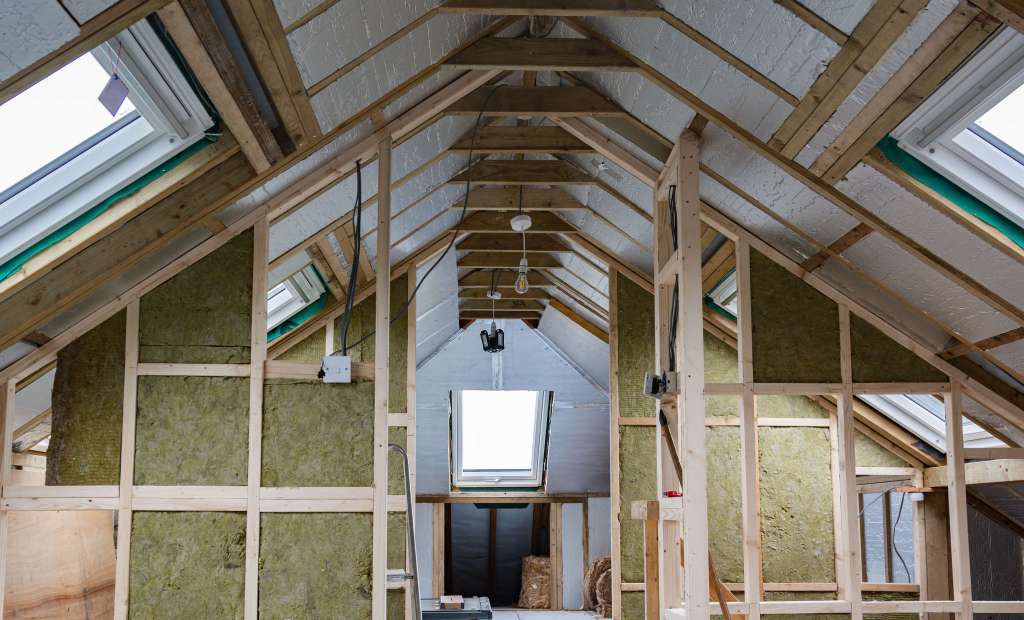Adding a loft conversion to your rental property could increase its value and allow you to have more tenants.
But how much does a loft conversion cost and what are the different types of renovations landlords need to consider?
How much does a loft conversion cost?
The cost of a loft conversion will vary depending on the type of conversion you choose and the amount of work that needs doing.
A small loft conversion is likely to cost around £20,000, with the cost going up to nearer £60,000 for a larger project.
Most of your budget will be spent on construction costs such as plastering, installing support beams, and plumbing. You’ll then need to furnish the new space, focusing on flooring, windows, and furniture.
You could hire a specialist loft conversion company to manage the whole project for you. Alternatively, you could manage the process yourself and hire a range of tradespeople from builders and plumbers, to glaziers and electricians.
If you take this approach, you may also need the services of a local designer or architect to help you plan the project and benefit from the best loft conversion ideas.
Before you hire anyone, get a range of quotes to make sure you’re getting the best deal.
What are the different types of loft conversion?
Rooflight conversion – this is the most basic and cheapest type of loft conversion. It involves adding windows to your existing roof structure to introduce light.
Dormer loft conversion – a dormer window is a raised, box structure which helps to increase the height of your loft space. It’ll cost more to create, but it gives you the opportunity to create something unique.

Hip to gable conversion – this intends to create more floor space and involves replacing a sloped part of the roof with a vertical gable wall, which allows it to include windows.
Mansard loft conversion – this is the most significant type of loft conversion and is likely to require planning permission. It’s also likely to cost the most and take the longest to complete. A mansard conversion involves straightening the roof to create extra space and could result in a new storey.
Do you need planning permission for a loft conversion?
You can convert a loft into a bedroom or extra living space without planning permission if it comes under permitted development rules.
If you don’t have to get planning permission, it could save you time and money. However, it’s always best to check with a professional architect or designer first to make sure you’re meeting loft conversion regulations.
Read our in-depth guide to permitted development rights for more information.
What loft conversions need planning permission?
You’ll need planning permission if you want a front dormer conversion, or if your extension is for one of the following:
- a maisonette or flat
- a listed building
- a home created through permitted development rights, such as an office or shop conversion
- a property in an area where permitted development rights are restricted, such as a World Heritage Site or national park
You can find out from your local authority whether or not you need planning permission. If you do, the application will cost £206 in England (with costs varying across the rest of the UK) and you should hear back within eight weeks.
Building regulations and the Party Wall Act
All loft conversions, whether they need planning permission or are built under permitted development rights, will need to comply with building regulations.
These are the government’s minimum standards on things like structural safety, insulation, electrical safety, ventilation, and drainage.
You’ll need to submit a building regulations application before you start work on your loft conversion, it’ll then be inspected by someone from your local council.
Make sure you keep all the building regulations paperwork as you’ll need it if you ever come to sell the property.

Another thing you’ll need to consider is the Party Wall Act. This means if your conversion affects any party walls (shared walls), you’ll need to get written permission from your neighbours.
How much value does a loft conversion add to a property?
Although it’s going to cost you, a loft conversion can add significant value to your property.
According to research by Nationwide, a loft conversion which adds an extra en-suite bedroom to a property can increase its value by around 21 per cent, while a separate study by Abbey Lofts found that it could increase to almost 25 per cent in London.
If you ever come to sell your property, a loft conversion could contribute towards a profit. Of course, it depends on the market you’re selling in, as well as the other properties in the area.
Will a loft conversion improve my rental yield?
As a landlord, the main benefit of getting a loft conversion is that it allows you to have more tenants. For example, with an extra bedroom you could let your property as an HMO (a property with three or more tenants from different households who share facilities).
The more tenants you rent to, the higher your monthly income will be. What’s more, you may be able to charge a higher rent if you have a high-quality conversion, whether you’re renting the property in its entirety or as separate rooms.
A higher rental income could improve your annual yield, which is the amount of money you get back after taking the cost of your property into account. You can find out more about how much you could be earning by checking out our free rental yield calculator.
Pros and cons of loft conversions for landlords
A loft conversion won’t be suitable for all landlords, but if executed properly it could be a solid long-term investment.
Here’s an overview of some of the pros and cons you need to think about before making your decision:
Advantages
- you can rent to more tenants, increasing your rental yield
- a high-standard conversion could make your property more desirable to renters
- you could add around 20 per cent in value to your property if you come to sell in the future
Disadvantages
- you’ll lose storage space in the loft, so you’ll need to find an alternative
- the whole process could take a few months, meaning you could lose rental income if the property is empty
- it could cost anything from. £20,000 up to £60,000, and there’s no guarantee you’ll stay under budget
Have you added a loft conversion to your rental property? Let us know in the comments below.
Get set with tailored landlord cover
Over 200,000 UK landlord policies, a 9/10 customer rating and claims handled by an award-winning team. Looking to switch or start a new policy? Run a quick landlord insurance quote today.
